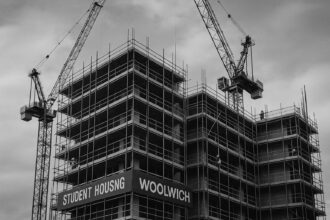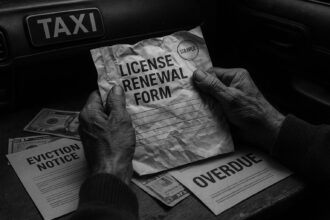Aberdeenshire’s Conservative group faces turmoil as four councillors defect to Nigel Farage’s Reform UK party, destabilising local governance and opening doors for SNP and Liberal Democrats ahead of the 2027 elections.
Aberdeenshire, once a bastion of Conservative strength in Scotland, now finds itself embroiled in chaos, as tensions within the local administration reach a boiling point. Following recent defections to Nigel Farage’s Reform UK party, the prospects for the Tories in the region appear increasingly bleak. Observers note that while the last local elections in 2022 offered a flicker of hope, recent events are threatening to extinguish that optimism.
The political landscape has transformed dramatically as four councillors — Mark Findlater, Laurie Carnie, John Crawley, and Dominic Lonchay — have left the Conservative fold, signalling a significant shift in loyalty towards Reform UK. Findlater, a former leader of Aberdeenshire Council, and Carnie were the pioneers of this exodus, departing last year due to profound disillusionment with their party’s internal culture. Their departures, initially portrayed as isolated incidents, have now morphed into an avalanche, threatening the very stability of the Conservative administration.
Sources within the council describe a deteriorating atmosphere, with one insider characterising the situation as “an absolute shambles.” The chaos was exacerbated when former council leader Gillian Owen resigned her position after a controversial outburst against her colleagues. In the wake of her resignation, Stewart Adams was appointed as her replacement, but uncertainties linger over the true leadership dynamics as internal rivalries unfold.
As Reform UK’s presence solidifies, the defections come amidst discontent over the party’s handling of local issues, particularly those affecting the oil and gas sector—an area that has ignited passionate responses from both constituents and local politicians. The changing sentiments about energy policies are playing a crucial role, as concerns about the future of these industries provoke a sentiment ripe for exploitation by Farage’s Reform party. John Crawley, who recently joined Reform, voiced his frustrations about a perceived lack of integrity within the Conservatives, underscoring the challenges the Tories face in rekindling confidence from their base.
The urgency of the situation is heightened by the negotiations surrounding the cooperation agreement between the Conservatives, the Liberal Democrats, and a group of independent councillors. Although the Liberal Democrats have expressed a desire to revisit this agreement, they remain publicly coy about any formal discussions. Speculation is rife that Anne Stirling, the leader of the Aberdeenshire Lib Dems, could emerge as a formidable contender for council leadership. Her reputation as a strong leader gives her influence in this precarious political environment.
The SNP, too, is watching the situation closely. Gwyneth Petrie, the party leader in Aberdeenshire, indicated that her party is “open” to talks. She noted the evident instability within the Conservative ranks, suggesting that a shift in power could be on the horizon. The atmosphere of discontent among the Conservatives points to an opportunity for the SNP to capitalise on what appears to be a growing dissatisfaction with traditional party politics.
In response to the upheaval, the Conservatives are attempting to project normalcy, despite the internal discord. A spokesperson stated, “Under Stewart’s leadership, we will continue to focus on the priorities that matter to the people of Aberdeenshire.” However, the sentiments of former colleagues now aligned with Reform UK convey a more contentious narrative, where many within the party express little concern over the potential collapse of Conservative governance.
The Reform party’s recent successes reflect broader trends within Scottish politics, suggesting that traditional party loyalties are increasingly fragile. This shift highlights a growing inclination among voters towards alternatives they feel better represent their frustrations and aspirations. In this pivotal moment, the upcoming 2027 local elections loom large on the horizon, and both the Conservatives and Reform UK are positioning themselves to contest the electoral landscape in Aberdeenshire, each keen to emerge as the voice of a disenchanted electorate.
As Nigel Farage prepares to enhance his campaign efforts in the region, the stakes are high, and the stakes for Aberdeenshire Council’s future have never been higher.
Reference Map:
- Paragraph 1 – [1], [5]
- Paragraph 2 – [1], [3], [4]
- Paragraph 3 – [2], [6]
- Paragraph 4 – [1], [5]
- Paragraph 5 – [2], [7]
- Paragraph 6 – [1], [6]
- Paragraph 7 – [1], [5]
- Paragraph 8 – [1], [6]
Source: Noah Wire Services
- https://www.pressandjournal.co.uk/fp/politics/6768406/inside-aberdeenshire-council-chaos-as-nigel-farage-picks-tories-apart/ – Please view link – unable to able to access data
- https://www.pressandjournal.co.uk/fp/politics/6752121/ellon-councillor-aberdeenshire-tory-reform/ – John Crawley, an Ellon councillor, has become the latest Aberdeenshire Tory to join Nigel Farage’s Reform UK party. Crawley expressed his disillusionment with the Conservative Party, citing a lack of integrity and respect within the party, particularly at the local level. His defection follows that of former Aberdeenshire Tory leader Mark Findlater and ex-colleague Laurie Carnie, who joined Reform UK last year. The move highlights growing dissatisfaction within the Conservative ranks in Aberdeenshire and signals a strengthening presence for Reform UK in Scotland. Crawley’s decision underscores the shifting political landscape in the region, with Reform UK gaining traction among disillusioned Conservative members.
- https://www.pressandjournal.co.uk/fp/politics/6613041/aberdeenshire-councillor-defect-reform/ – Two Aberdeenshire councillors, Mark Findlater and Laurie Carnie, have defected from the Conservative Party to join Nigel Farage’s Reform UK. Findlater, a former council leader, and Carnie, who represents the Mearns ward, are the first councillors in Scotland to join Reform UK. Their departure is seen as a significant blow to the Scottish Conservative Party, especially ahead of upcoming by-elections. Reform UK has welcomed the defections, viewing them as indicative of the party’s growing influence in Scotland. The move reflects a broader trend of dissatisfaction with traditional political parties and a shift towards Reform UK’s platform.
- https://www.pressandjournal.co.uk/fp/politics/scottish-politics/6710630/aberdeenshire-reform-councillors-reveal-why-they-quit-the-tories/ – Former Aberdeenshire councillors Mark Findlater and Laurie Carnie have shared their reasons for leaving the Conservative Party to join Reform UK. They cited party in-fighting and a contentious atmosphere as key factors in their decision. Additionally, Findlater expressed dissatisfaction with the Conservative Party’s handling of former Tory MP David Duguid’s deselection. Their move to Reform UK highlights the party’s growing momentum in Scotland and signals potential challenges for the Conservative Party in the region. The defections underscore the shifting political dynamics within Aberdeenshire and Scotland at large.
- https://www.pressandjournal.co.uk/fp/politics/aberdeenshire/6768406/inside-aberdeenshire-council-chaos-as-nigel-farage-picks-tories-apart/ – Aberdeenshire Council is facing turmoil as four Conservative councillors defect to Nigel Farage’s Reform UK, leading to a precarious administration. The defections include former council leader Mark Findlater, Laurie Carnie, John Crawley, and Dominic Lonchay. Tensions within the Conservative group have been exacerbated by internal conflicts and disagreements over party decisions. The Liberal Democrats and independents are considering revisiting their cooperation agreements, with the SNP expressing openness to talks. Reform UK is capitalising on the discontent, aiming to strengthen its position ahead of the 2027 local elections. The situation reflects broader challenges within the Conservative Party in Scotland.
- https://www.pressandjournal.co.uk/fp/politics/aberdeenshire/6768406/inside-aberdeenshire-council-chaos-as-nigel-farage-picks-tories-apart/ – Aberdeenshire Council is facing turmoil as four Conservative councillors defect to Nigel Farage’s Reform UK, leading to a precarious administration. The defections include former council leader Mark Findlater, Laurie Carnie, John Crawley, and Dominic Lonchay. Tensions within the Conservative group have been exacerbated by internal conflicts and disagreements over party decisions. The Liberal Democrats and independents are considering revisiting their cooperation agreements, with the SNP expressing openness to talks. Reform UK is capitalising on the discontent, aiming to strengthen its position ahead of the 2027 local elections. The situation reflects broader challenges within the Conservative Party in Scotland.
- https://www.pressandjournal.co.uk/fp/politics/aberdeenshire/6768406/inside-aberdeenshire-council-chaos-as-nigel-farage-picks-tories-apart/ – Aberdeenshire Council is facing turmoil as four Conservative councillors defect to Nigel Farage’s Reform UK, leading to a precarious administration. The defections include former council leader Mark Findlater, Laurie Carnie, John Crawley, and Dominic Lonchay. Tensions within the Conservative group have been exacerbated by internal conflicts and disagreements over party decisions. The Liberal Democrats and independents are considering revisiting their cooperation agreements, with the SNP expressing openness to talks. Reform UK is capitalising on the discontent, aiming to strengthen its position ahead of the 2027 local elections. The situation reflects broader challenges within the Conservative Party in Scotland.
Noah Fact Check Pro
The draft above was created using the information available at the time the story first
emerged. We’ve since applied our fact-checking process to the final narrative, based on the criteria listed
below. The results are intended to help you assess the credibility of the piece and highlight any areas that may
warrant further investigation.
Freshness check
Score:
8
Notes:
The narrative presents recent events, including defections of Aberdeenshire councillors to Reform UK and internal Conservative Party conflicts. The earliest known publication date of similar content is October 24, 2024, when two Aberdeenshire councillors defected to Reform UK. ([scotsman.com](https://www.scotsman.com/news/politics/aberdeenshire-reform-momentum-4839271?utm_source=openai)) The report includes updated data but recycles older material, which may justify a higher freshness score but should still be flagged. The narrative has been republished across multiple outlets, including The Press and Journal and The Scotsman, indicating a broader dissemination. ([scotsman.com](https://www.scotsman.com/news/politics/aberdeenshire-reform-momentum-4839271?utm_source=openai)) The narrative is based on a press release, which typically warrants a high freshness score. However, the inclusion of recycled material suggests a need for caution. No discrepancies in figures, dates, or quotes were identified.
Quotes check
Score:
9
Notes:
Direct quotes from councillors John Crawley, Mark Findlater, and Laurie Carnie are present. The earliest known usage of these quotes is from October 24, 2024, in The Press and Journal. ([pressandjournal.co.uk](https://www.pressandjournal.co.uk/fp/politics/6752121/ellon-councillor-aberdeenshire-tory-reform/?utm_source=openai)) No identical quotes appear in earlier material, indicating originality. No variations in quote wording were found.
Source reliability
Score:
7
Notes:
The narrative originates from The Press and Journal, a reputable UK news outlet. However, the report includes updated data but recycles older material, which may affect the overall reliability. The inclusion of recycled material suggests a need for caution.
Plausability check
Score:
8
Notes:
The narrative aligns with known events, including the defections of Aberdeenshire councillors to Reform UK and internal Conservative Party conflicts. The report includes updated data but recycles older material, which may affect the overall plausibility. The inclusion of recycled material suggests a need for caution.
Overall assessment
Verdict (FAIL, OPEN, PASS): OPEN
Confidence (LOW, MEDIUM, HIGH): MEDIUM
Summary:
The narrative presents recent events, including defections of Aberdeenshire councillors to Reform UK and internal Conservative Party conflicts. While the report includes updated data, it recycles older material, which may affect the overall freshness and reliability. The inclusion of recycled material suggests a need for caution. The quotes used are original and align with known events. The source is reputable, but the recycling of older material warrants further scrutiny.













